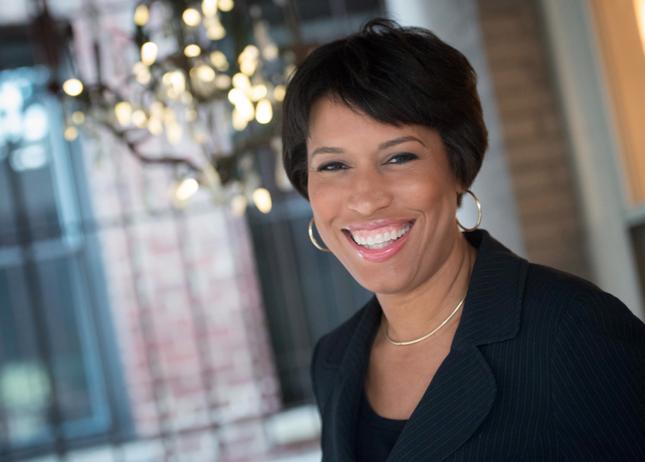Muriel Bowser, from a D.C. Neighborhood, Running to Become Mayor of D.C.
By • November 6, 2014 0 2306

Sitting at Qualia Coffee, a smallish and relatively new coffee shop on Georgia Avenue in the D.C., neighborhood of Petworth, you realize just how much Washington, D.C., has changed and is continuing to change. In some ways, this is the eye of the change storm or at least an emblematic illustration of what was going on the city, with the election of a new mayor only days away.
Muriel E. Bowser, who remains the favorite in a three-way race for mayor, the Ward 4 councilmember, who won the Democratic Primary going away, has changed quite a bit, too, since she was first elected to the District Council when Adrian Fenty was elected Mayor of Washington, D.C., in 2008.
“Washington’s changed have changed a lot, and the change has been swift,” she said as we sat on a soft couch in the crowded coffee shop in Petworth, which is experiencing an influx of new, younger residents, part of the millennial generation explosion that’s going on in D.C. neighborhoods.
She declined an offer of coffee from an assistant. “I’ve had too much already today,” she said. She has become during the course of a hectic, combative primary campaign and a drawn out general election campaign, a confident, strong campaigner and politician, who — when push came to shove — managed to hold her own in the four debates that were held and in the much more frequent primary candidate forum encounters.
In the end, she emerged victorious over incumbent Mayor Vincent Gray, Councilmembers Jack Evans, Tommy Wells and Vincent Orange as well as Busboys and Poets owner Andy Shallal. She will have run the table if she wins Nov. 4 in the general election. Polls to date have shown her initially with a double-digit lead over Independent David Catania, who had to give up his at-large Council seat to run, while Carol Schwartz, also an independent trailed in third. That lead, according to other polls dwindled early in October, while a more recent poll saw her on the rise again.
The atmosphere remains unsettled, with voters not entirely happy with the choices, as the electorate changes with changing times.
We offered that this was the first time that the general election gives the appearance of being competitive—an assertion to which she offered some skepticism, when asked, and replied, “Is it?”
“It’s certainly been long,” Bowser said. “That’s one of the things that’s different. But we’re doing extremely well, I think. We’re strong across the city, and it’s been certainly an interesting process. That can be a challenge.”
“But you know what the upside to all this is?” she asked. “You get to talk to the people face to face, who live here, not just in my ward, but all over the city. You see that everyone has the same worries and concerns all over the city, but in different ways, with different priorities. Everyone is concerned about jobs, about housing, job training, our schools. There has been considerable anxiety across the wards about the fast pace of growth. We’ve got to make sure that people who want to stay here, can afford to stay here, and that means more affordable house, more planning with affordable housing as a component.”
Bowser has followed the Fenty approach to electioneering—she knocked on every door in her Ward 4 election, and she’s followed a similar face-to-face contact pattern in the general and primary elections. She stays in touch with Fenty and presumably has learned from him. “We still talk by phone regularly,” she said.
These days, she brings confidence into any room—you could see it during the primary forums, when she’s greeting people on the move, or in the recent debates. You could see it sitting next to her at the coffee shop. “I have what you might call an extrovert-introvert personality, depending on the situation,” she said. “The extrovert part has a lot of energy.”
“When I was elected to the City Council, I felt that I came from one of the most diverse ward in the city,” she continued. “That’s given me the experience of being able to deal with all kinds of people. We had everything—black, white, men and women, young and old, gay and straight. I think I’m the best candidate to deal with all of the people in the city.”
Bowser grew up in a big family—five and she was the youngest—went to Catholic school, worked for an insurance company and later got her master’s degree in public policy at American University. She became active in her ward and served on the advisory neighborhood commission. Fenty hand-picked her to run for his council spot. She ended up wanting to be in public service, said said, “not to be a back-slappping politician, but to help people, to facilitate change. I thought politics and government is where you could accomplish the most.” She came naturally to politics. Her father Joe, a Democrat and activist, was an neighborhood commissioner, a community watchdog and is now 79.
She is a neighborhood person, in the sense that she’s kept her ties, her friends and family, close to her and stirred by the lives of people in neighborhoods. “I still have the same friends from high school,” she said. “When you’re running for office that’s a good thing to have.”
“When you’re talking about ‘One City’ [Mayor Gray’s motto for uniting D.C.], that’s not a simple concept,” Bowser said. “This is a city of neighborhoods. They have an identity, and it’s not just about color or party. It’s about jobs, safety, the services, schools, where and how you live. ‘One City’ means everybody has a chance to have the same services from government, and that’s good government.”

